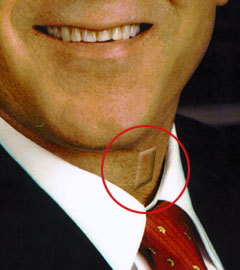Laryngeal Bleep Implant Improves Political Discourse
Washington, D.C., November 9, 2015 -- The level of political discourse in America has improved by a whopping 43% since the Laryngeal Bleep Implant became a requirement for all politicians early last year, a new study shows.
 Politician equipped with the discreet, effective Laryngeal Bleep Implant
Politician equipped with the discreet, effective Laryngeal Bleep Implant
Proponents of the Laryngeal Bleep Implant hail the latest polling as a resounding success for the initially controversial measure, while skeptics tend to complain much of the voyeuristic drama has been removed from traditional rough-and-tumble politics.
The Laryngeal Bleep Implant, or LBI, first proposed in 2008 by the grass-roots initiative Americans For a Little Honesty In Government Please If It's Not Too Much To Ask and first tested on a human being in 2013, is the small device implanted in the necks of public servants that functions as a proactive self-censor during public speaking.
Measuring a mere 2x5x0.5 cm, the device, which is implanted in the neck near the trachea and the larynx, contains an intricate network of sensors that monitor heart rate, blood pressure, respiration, skin conductivity, apocrine perspiration, capillary dilation, and a range of other indicators in its host.
When the LBI detects that the host individual, usually a politician, is about to utter a lie, deception, pejorative, ad hominem attack, or other remark inappropriate within the context of political discourse, the device emits an ultrasonic signal that instantaneously and temporarily immobilizes the larynx, preventing the sounds from being formed. A small electric shock is also applied, temporarily paralyzing the jaw muscles to minimize the risk of lip-reading and apprizing the politician of his or her error through negative reinforcement.
"I have to admit I had high hopes for the LBI, but the results have surpassed anything I could have imagined," said Dr. Shirley Weaver, inventor of the Laryngeal Bleep Implant. "Granted, it takes time to grow accustomed to all the dead air whenever a politician speechifies, but, as we've seen, the long stretches of silence are gradually diminishing. Bumping up the shock voltage, as we did after the three-month phase-in period, seems to be having a positive effect. I've never seen so many pop-eyed senators in my life."
The Laryngeal Bleep Implant runs on a small battery that is continually recharged through the body's own electrical system by means of the brain's neural activity. The power systems have thus far functioned flawlessly in a most politicians with a few exceptions, including Jeff Sessions (R-AL), in whom the batteries have had to be replaced due to charging failure.
"It works like a self-winding watch," Dr. Weaver said. "If you just sit around on the couch all day, obviously it's going to eventually stop ticking."
The LBI is designed to self-activate when a politician approaches a podium or other microphone-equipped stand with the intent of giving a public speech or press briefing, providing court testimony, or participating in a summit meeting. It can also be activated remotely if there is no microphone present.
In other contexts, such as private conversations between the host and, for example, a wife, husband, mistress, constituent, prostitute, or lobbyist, the device is inactive and the host is able to prevaricate freely.
The LBI is now mandatory for all political incumbents and anyone who has registered as a candidate for public office. The surgical procedure, which is performed in less than ten minutes using only local anesthetic, is deemed risk-free and can be readily reversed if, for example, a candidate fails to win or an incumbent's term expires.
An FCC proposal is in the works that would also include non-elected public figures who hold a significant sway over public discourse, such as popular infoganda network news anchors and talk show hosts, in the LBI program. Thus far the proposal has met with major resistance from network owners, who fear that viewers will not tune in and television and radio advertisers will not be willing to sponsor long segments of complete silence. Another proposal would include the CEOs of publicly-traded companies. Both issues are currently being quietly debated on the House floor.
"The networks are trying to claim that this is a form of censorship, but censorship can only be applied externally," Wyvern Albertson, FCC spokesman, said. "In this case, it's their own metabolism that's telling them when they're out of line."
While the Laryngeal Bleep Implant has thus far proven highly effective in typical individuals, a limitation is that a host must be aware that he or she is lying for the device to function effectively.
"The one case in which the LBI doesn't work very well is in clinical psychotics, whose absent sense of right and wrong effectively neutralizes any physiological response to lying," Dr. Weaver said. "Luckily, that group currently comprises less than half of our political and corporate leadership."
By Ion Zwitter, Avant News Editor
Related stories
- Maine Voters Outlaw Homo Sapiens Marriage in Referendum
- Citigroup, Bank of America Announce ATM Instant Equity Exchange Program
- Super Bowl XLIII to Feature Real-time Biometric Player Data
- Justice Roberts Admits to "Taking a Dive" During Oath of Office
- Hillary Vows to Press On in Face of North Carolina, Indiana Primary Setbacks
- AutoChat Fills the Solo Driver's Cell Phone Void
- Candidate McCain Vows Not To Repeat Mistakes of 2000, 2008, 2012 Campaigns
- John McCain Politely Refuses Mitt Romney Endorsement
- Pledging "Fresh, Clean Start", Disney Clones Britney
Copyright © 2005-2505 AvantNews.com. All rights reserved.
Avant News contains satire and other fictional material, provided for entertainment purposes only. Disclaimer. Syndicate. Privacy.











